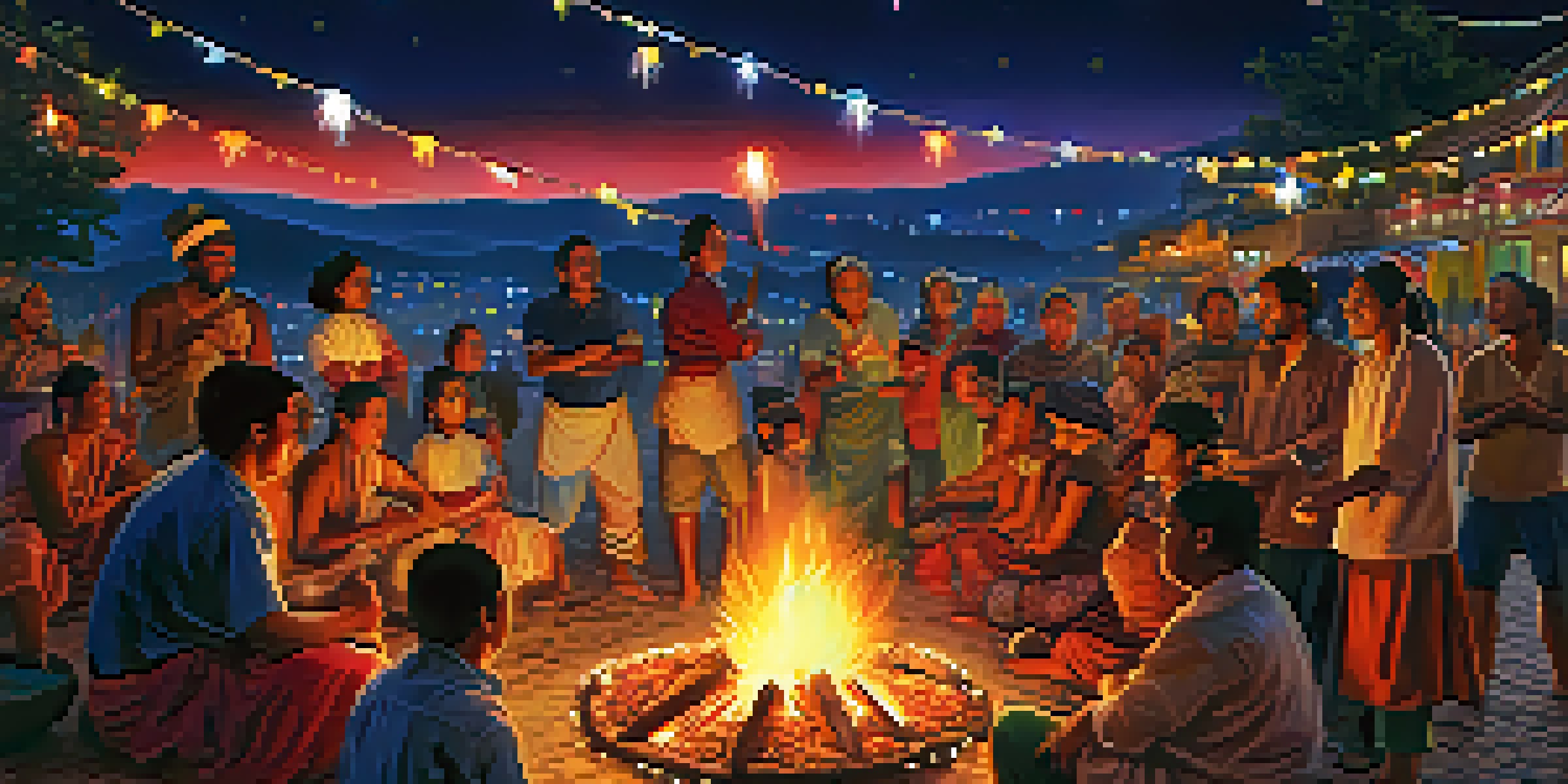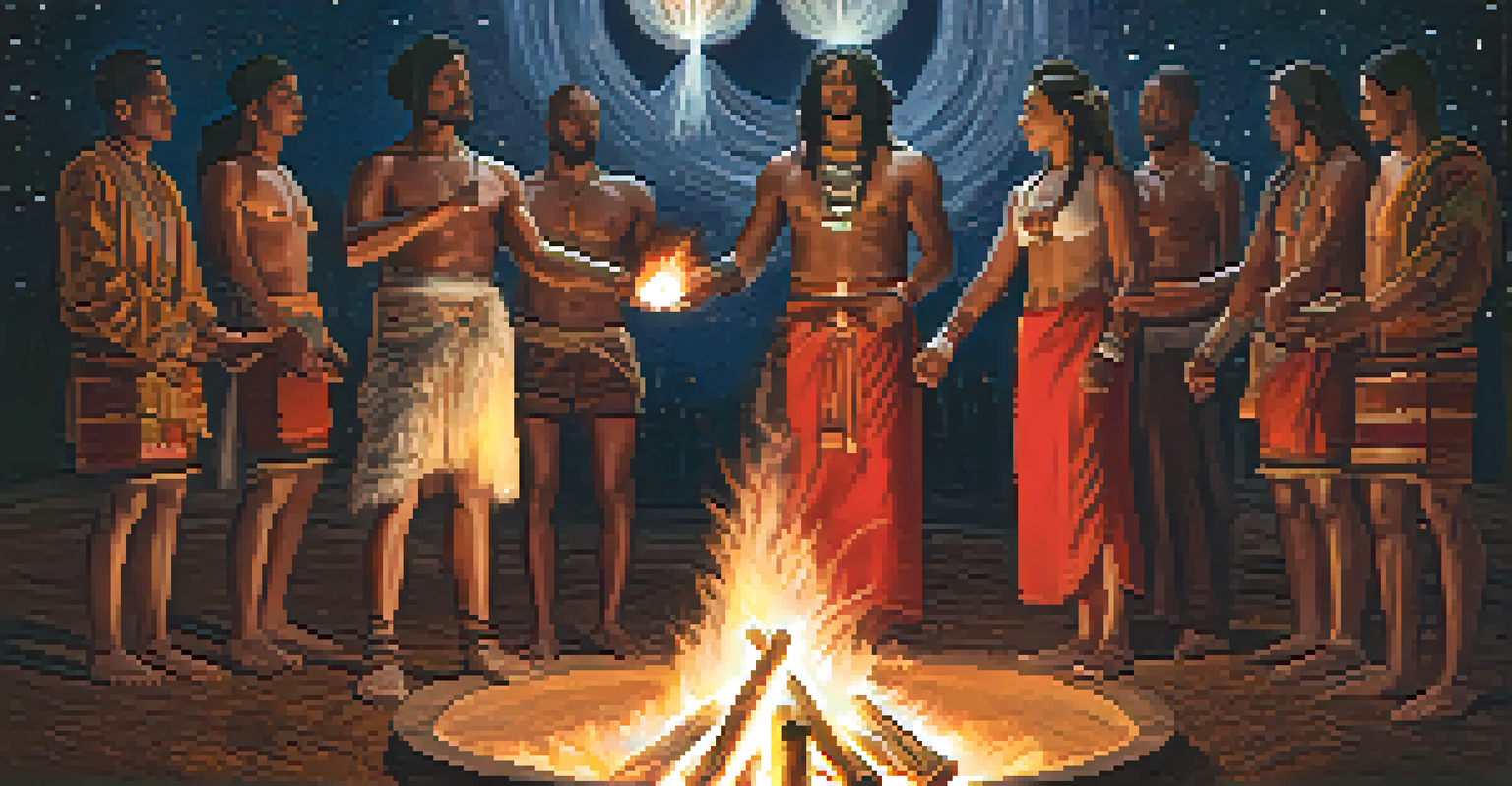The Significance of Fire in Spiritual Rituals Worldwide

Fire as a Symbol of Purification and Renewal
Throughout history, fire has been seen as a powerful symbol of purification. Many cultures believe that fire can cleanse the spirit, helping individuals to let go of negativity and embrace renewal. For instance, in various indigenous cultures, burning sage or other herbs is a common ritual to purify a space and invite positive energies.
Fire is the most tolerable teacher. It gives you a lesson in the most painful way.
Moreover, fire is often associated with transformation; it can destroy the old to make way for the new. This concept is beautifully illustrated in the practice of the burning of effigies, which symbolizes the release of past grievances and the welcoming of fresh beginnings. By setting something ablaze, participants engage in a ritual that embodies both loss and hope.
In essence, fire serves as a reminder of the cyclical nature of life, emphasizing that endings often lead to new opportunities. This duality can resonate with many, making fire a pivotal element in spiritual practices worldwide.
Fire as a Connector to the Divine
In many spiritual traditions, fire is seen as a direct link between the earthly and the divine. For instance, in Hinduism, the sacred fire, or 'Agni,' is invoked during ceremonies to carry prayers to the gods. This belief highlights the idea that fire acts as a mediator, facilitating communication between humans and higher powers.

Similarly, in various African cultures, fire is integral to rituals that honor ancestors. Lighting a fire during these ceremonies is believed to invite the spirits of the deceased to join the living, creating a bridge between past and present. The flames serve as a beacon, guiding these spirits and ensuring they are remembered.
Fire as a Purifier and Transformer
Fire symbolizes purification and renewal, helping individuals release negativity and embrace new beginnings.
Thus, fire is not just a physical element; it embodies spirituality and connection. Its flickering flames resonate with many, creating a profound sense of unity during rituals across the globe.
Rituals of Sacrifice and Offering Involving Fire
Sacrifice is a common theme in many spiritual practices, and fire often plays a central role in these offerings. In ancient cultures, animal sacrifices were commonly performed, with the flames serving as a means to honor deities and seek their favor. The act of burning offerings symbolizes the giving of one's best to the divine, showcasing devotion and reverence.
The flame that burns Twice as bright burns half as long.
In modern practices, offerings can take various forms, from food to symbolic objects. For example, in some Buddhist traditions, practitioners may light a candle or incense as an offering, allowing the smoke to carry their intentions to the universe. This act emphasizes mindfulness and the desire to connect with a higher purpose.
Ultimately, these rituals remind us of the importance of sacrifice in spiritual growth. Fire, as a transformative element, helps to convey gratitude and intentions, making it a vital part of these practices.
Fire in Festivals and Celebrations Worldwide
Fire is not only a tool for personal purification and offering but also a significant element in communal celebrations. Many festivals around the world include fire as a central feature, creating a sense of togetherness and joy. For example, the Hindu festival of Diwali celebrates the victory of light over darkness, with countless oil lamps and fireworks illuminating the night sky.
Similarly, in the tradition of 'Hogmanay' in Scotland, bonfires are lit to symbolize the end of the old year and the welcoming of the new. These gatherings foster community spirit, as people come together to celebrate and reflect, often sharing stories and warmth around the fire.
Fire Connects to the Divine
Many cultures view fire as a mediator between the earthly and the divine, facilitating communication during spiritual rituals.
In essence, fire acts as a communal bond, bringing people together in celebration and shared experience. Whether through rituals or festivities, it plays an essential role in creating cherished memories and connections.
Fire as a Source of Guidance and Inspiration
Historically, fire has been a source of light in the darkness, guiding travelers and providing safety. This metaphor extends into the spiritual realm, where fire symbolizes guidance and inspiration in one’s journey. Many spiritual seekers view the flame as a beacon, illuminating the path toward self-discovery and enlightenment.
In various traditions, the act of lighting a candle during meditation signifies the quest for inner clarity and insight. The small flame serves as a focal point, encouraging practitioners to reflect and seek understanding within themselves. This simple act can transform a space, creating a sanctuary for spiritual exploration.
Thus, fire embodies not just physical light but also metaphorical illumination. It encourages individuals on their spiritual journeys to find their paths and discover their truths, serving as a powerful motivator.
The Symbolism of Fire in Mythology and Folklore
Fire has long been a significant symbol in mythology and folklore, representing various themes, including creation, destruction, and transformation. Many cultures have creation myths that involve fire, such as the Greek tale of Prometheus, who stole fire from the gods to give to humanity. This act of defiance symbolizes enlightenment and the quest for knowledge.
Conversely, fire can also represent destruction and chaos, as seen in myths where deities wield flames to punish or cleanse humanity. These narratives remind us of the dual nature of fire—while it can foster growth, it can also wreak havoc if left unchecked. This duality serves as a powerful metaphor for human experiences and emotions.
Fire in Modern Spiritual Practices
Today, fire remains a transformative element in spiritual practices, aiding in emotional release and personal growth.
Ultimately, fire's presence in mythology enriches our understanding of its significance. It embodies the complexities of life, illustrating how something so elemental can carry deep cultural and spiritual meanings.
The Role of Fire in Modern Spiritual Practices
Today, fire continues to play a vital role in various modern spiritual practices, adapting to the needs and beliefs of contemporary seekers. Many people incorporate candle rituals into their daily lives, using the act of lighting a candle as a way to set intentions or create a sacred space for reflection. This practice is a simple yet powerful way to connect with the energy of fire.
Moreover, in holistic healing practices, fire is often used in ceremonies like 'fire ceremonies' or 'burning rituals' to release emotional burdens. Participants write down negative thoughts or experiences and then burn the paper, symbolizing the release of those energies. This therapeutic use of fire helps individuals process emotions and find closure.

In this way, fire remains a relevant and transformative element in spiritual practices worldwide. It connects us to ancient traditions while also offering a modern avenue for healing and personal growth.